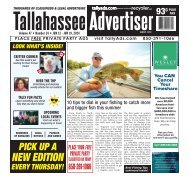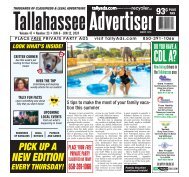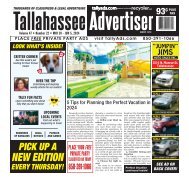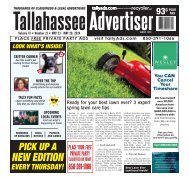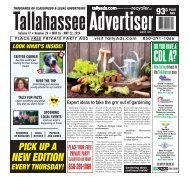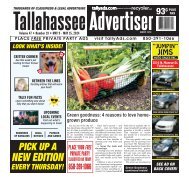2008_B_IC
Create successful ePaper yourself
Turn your PDF publications into a flip-book with our unique Google optimized e-Paper software.
SEE OUR AD ON PAGE 13
THE TRUCKER NEWs CHANNEl<br />
is TheTrucker.com’s exclusive<br />
weekly video program featuring<br />
current events and trucking<br />
industry news.<br />
In addition to TheTrucker.com,<br />
The Trucker News Channel is<br />
available on Facebook, YouTube,<br />
AppleTV, Roku and Amazon TV.<br />
TUNE IN AND WATCH AT THETRUCKER.COM
THANK YOU to Flatbed Truck Drivers and<br />
All Essential Workers on the Front Line<br />
of Covid-19<br />
• Local, Regional & OTR<br />
• Great Home Time &<br />
Benefits including Paid<br />
Holidays<br />
• Percentage Paid Weekly<br />
• Ask About Our Pay<br />
Guarantee & Vacation<br />
PAID TRAINING PROGRAM FOR COMPANY DRIVERS<br />
APPLY ONLINE NOW<br />
www.piimx.com<br />
866.819.8913<br />
PAID TRAINING PROGRAM FOR COMPANY DRIVERS
CONTENTS<br />
aUGUST MAY 2019 2020 • VOLUME • Volume 2221 • ISSUE • Issue 5 8<br />
Truck TRUCK stop<br />
STOP<br />
Family Claude tradition: Crook chose TJ<br />
Kounkel OTR career is a third-<br />
despite<br />
generation losing 6 family trucker members with<br />
award-winning to drugged truck Peterbilt<br />
driver<br />
Page Page 12 8<br />
<strong>IC</strong> News<br />
NEWS<br />
California Intelligent adopts Imaging first-ofits<br />
Systems kind requirement technology for<br />
zero-emission used to find trucks<br />
CMV<br />
parking at truck<br />
stops in Midwest<br />
Page 10<br />
18<br />
PRODUCT Product Profile<br />
PROFILE<br />
Truck Friction, owners kits should<br />
and<br />
check reman: expiration Bendix dates,<br />
Spicer<br />
quality Foundation of DEF Brake before<br />
buying<br />
offers guide to air disc<br />
brake aftermarket<br />
Page 24 16<br />
Member of NATSO, Inc.<br />
s t a f f<br />
Published by:<br />
General Manager Megan Hicks<br />
Sales Manager Ed Leader<br />
Creative Director Kelly Young<br />
Accounts 1123 S. Payable University, Patricia Suite 325<br />
Austerie<br />
Little Rock, Editor AR 72204-1610<br />
Sean O'Connell<br />
Telephone: (501) 666-0500<br />
Advertising Fax: (501) Account 666-0700<br />
Executives<br />
E-mail: info@thetruckermediagroup.com<br />
Jerry Critser<br />
770.416.0927<br />
jerryc@targetmediapartners.com<br />
Chief Executive Officer<br />
Bobby John Hicks Ralston<br />
bobbyr@thetruckermedia.com<br />
1.770.418.9789<br />
johnh@targetmediapartners.com<br />
General Meg Larcinese Manager<br />
Megan 1.678.325.1025 Cullingford-Hicks<br />
meganh@thetruckermedia.com<br />
megl@targetmediapartners.com<br />
Greg Managing McClendon Editor<br />
1.678.325.1023<br />
Wendy Miller<br />
gregmc@targetmediapartners.com<br />
wendym@thetruckermedia.com<br />
Dennis Ball<br />
Production 1.678.925.0197 Manager<br />
dennisb@targetmediapartners.com<br />
Rob Nelson<br />
robn@thetruckermedia.com<br />
Graphic Artist<br />
Christie McCluer<br />
christie.mccluer@thetruckermedia.com<br />
Wilshire Classifieds, LLC<br />
For advertising opportunities,<br />
P.O. Box 2685<br />
please contact Megan Cullingford-Hicks<br />
Anniston, AL 36202<br />
at (256) meganh@thetruckermedia.com.<br />
237-2801 • (256) 237-2802 Fax<br />
COPYRIGHT: Copyright 2019 Wilshire Classifieds, LLC. Publisher<br />
as sumes no responsibility for unsolicited material. Reproduction in<br />
Publishers whole or in Rights: part without All written advertising, permis sion including is prohibited. artwork All and advertisements,<br />
and/or becomes editorials the are property accepted of and the published publisher by Publisher once pub-<br />
on<br />
photographslished<br />
the representation and may be that reproduced the advertiser, in its any advertising media only agency, by and/or publisher.<br />
the<br />
Publisher supplier of reserves the contents the are right authorized to refuse to publish or edit the entire any contents ad without<br />
and<br />
notice subject and matter does thereof. not The screen advertiser, or endorse its advertising advertisers. agency and/or Publisher<br />
the<br />
is supplier not liable of the contents for any will damages defend, indemnify resulting and from hold Publisher publication harmless<br />
from to and publish against all any or any loss, part expense of any or other ad or liability, any errors resulting in from ads.<br />
or<br />
failure Adjustments any claims or suits are limited for libel, violation to the cost of privacy, of space plagiarism, for the copyright ad, or or at<br />
Publisher’s trademark infringement option, republication and any other claims for one or suits insertion that may with rise notice<br />
out of<br />
received publication within of such three contents. days Press of first releases publication. are expressly Copyright covered 2020 within of<br />
Wilshire the definition Classifieds, of contents. LLC. Subject also to Ad and Privacy Policy at<br />
www.recycler.com.<br />
Hundreds of Jobs www.TheTrucker.com/jobs Independent Contractor 2020 5
Coal City Cob<br />
Company, Inc.<br />
Hiring Company Drivers<br />
& Owner Operators<br />
In 1970, the Cloonen family<br />
started Coal City Cob with one<br />
truck and a plan. Fifty years<br />
later, that plan spans the nation<br />
with over 200 drivers providing<br />
quality service to chemical and<br />
hazardous waste customers. At<br />
the heart of it, though, we’re<br />
just folks that love trucking. As<br />
the big get bigger, we welcome<br />
you to join us and remember<br />
what it’s like to work in a culture<br />
that is family. We look forward<br />
to hearing from you soon.<br />
TERMINAL LOCATIONS<br />
CHARLOTTE<br />
Charlotte, NC<br />
CHIGAGO<br />
Diamond, IL<br />
CINCINNATI<br />
Cincinnati, OH<br />
DALLAS<br />
Waxahachie, TX<br />
HOUSTON<br />
La Porte, TX<br />
LOUISIANA<br />
St. Gabriel, LA<br />
MORROW<br />
Morrow, GA<br />
NEW JERSEY<br />
Rahway, NJ<br />
Pedricktown, NJ<br />
888-860-2434<br />
Drive4CCCOB.com
Family tradition: TJ Kounkel is a third-generation<br />
trucker with award-winning Peterbilt<br />
Farming and trucking are two professions<br />
that often run in families. TJ Kounkel’s<br />
family has a tradition of both.<br />
In addition to farming 2,000 acres of corn<br />
and soybeans in northwest Iowa, his family<br />
operates a livestock-hauling business. Driving<br />
farm equipment and even trucks on the farm<br />
were just part of growing up for Kounkel.<br />
“I started driving at 18, driving intrastate. I<br />
know every road in Iowa,” he told The Trucker,<br />
adding that talking about himself isn’t easy<br />
for him.<br />
Courtesy: TJ Kounkel<br />
TJ Kounkel, third from left, entered his<br />
Peterbilt in the 2019 No Coast Large Cars<br />
Truck Show in Britt, Iowa. He is shown here<br />
with his dad, Chad Kounkel, left; his cousin,<br />
Jackson Kounkel, second from left; and<br />
his grandfather, Jack Kounkel, right. His<br />
truck earned trophies for first place Limited<br />
Mileage, Best of Show Tractor/Trailer and<br />
People’s Choice Award.<br />
Cliff Abbott<br />
“I’m kind of boring,” he said. “When<br />
I’m not trucking, I stay busy with the farm.<br />
There’s always something to do.”<br />
On the other hand, talking about his<br />
truck isn’t a problem at all. Kounkel drives<br />
a 2018 Peterbilt 389 with a Caterpillar C-15<br />
Acert engine and an 18-speed transmission.<br />
“We took the engine down to the bare<br />
block, and everything was balanced and<br />
blueprinted going back together,” he said.<br />
“We’re running CAT compound turbos<br />
pushing around 700 hp.”<br />
The truck was put together in the family<br />
shop, at the farm.<br />
“All of the work was done in our shop; we<br />
build all of our own gliders,” he explained.<br />
“Only some of the work, like the upholstery<br />
and the major engine work, was hired out.”<br />
The family currently runs 14 trucks, all<br />
gliders. Kounkel’s truck was ordered as a<br />
glider in 2017, with most of the assembly<br />
taking place on the farm.<br />
“The truck was delivered to our shop in<br />
the fall of 2017 and put in storage until we<br />
started building it the first part of 2019,” he<br />
said. “It took about six months from start to<br />
finish just in time for the Great American<br />
Truck Show (GATS) in Dallas.”<br />
Improvements made to the truck include<br />
custom seats, stereo and shag carpeting.<br />
“The entire interior was taken out so<br />
Dynamat sound-dampening material could<br />
be put down to keep all the sound out of the<br />
cab,” he explained.<br />
Kounkel’s truck took Best of Show in<br />
8 Independent Contractor 2020 Hundreds of Jobs www.TheTrucker.com/jobs
Courtesy: TJ Kounkel<br />
TJ Kounkel drives a 2018 Peterbilt 389 with a Caterpillar C-15 Acert engine and an 18-speed<br />
transmission. He did the majority of the work to turn this rig into a show truck at the shop on his<br />
family’s farm.<br />
the Limited Mileage category at GATS last<br />
year and has won awards at local shows.<br />
“The best part of showing trucks is the<br />
show itself — the people you get to meet<br />
and the trucks you get to see,” he said.<br />
Kounkel hauls cattle and hogs in a 2020<br />
Wilson Silverstar Livestock trailer, mostly<br />
to processing centers. Business is slow in<br />
the current environment.<br />
“Everybody is locked down on us, so<br />
it’s pretty slow,” he said. “Some of the<br />
processing plants have cut back on how<br />
many they’ll take, and some have closed<br />
down entirely. We’re not taking nearly the<br />
hogs and cattle.”<br />
When he isn’t farming or working on<br />
trucks, Kounkel is planning for the future.<br />
Only 22 years old, he said he plans to stay<br />
in northwest Iowa.<br />
“I bought 100 acres and a house next<br />
to our farm,” he explained. “I’m pretty<br />
blessed. I have a little shop, but I haven’t<br />
done anything with it yet. We work on<br />
gliders at the farm.”<br />
The closest “big” city to the Kounkel<br />
farm is Sioux City, Iowa, population 83,000.<br />
The countryside is an endless sea of corn and<br />
soybeans. “Yep, it’s a lot of corn,” he said.<br />
When he’s traveling, his girlfriend<br />
sometimes goes along. “She likes to ride<br />
with me, but there’s a lot of sleeping,” he<br />
quipped.<br />
With four years of driving, the family<br />
farm and now, a home and his own acreage,<br />
TJ Kounkel represents the third generation<br />
in both businesses. He has a solid plan<br />
laid out for his future, one that is bound to<br />
include more awfully nice trucks.<br />
Hundreds of Jobs www.TheTrucker.com/jobs Independent Contractor 2020 9
Independent Contractor<br />
News<br />
August 2020<br />
California adopts first-of-its kind<br />
requirement for zero-emission<br />
trucks<br />
Independent Contractor News Service —<br />
By 2045, every new truck sold in California will<br />
be zero-emission. That’s according to the California<br />
Air Resources Board (CARB), which on<br />
June 25 adopted a first-in-the-world rule requiring<br />
truck manufacturers to transition from diesel<br />
trucks and vans to electric zero-emission trucks<br />
beginning in 2024 and culminating in 100%<br />
zero-emission trucks by 2045.<br />
A statement from CARB describes the move<br />
as “bold and timely,” adding that it sets a cleantruck<br />
standard for the nation and the world and<br />
marks the most important air-pollution regulation<br />
to date implemented by California Gov.<br />
Gavin Newsom’s administration. The rule zeroes<br />
in on air pollution in the state’s most disadvantaged<br />
and polluted communities.<br />
“California is an innovation juggernaut that<br />
is going electric. We are showing the world that<br />
we can move goods, grow our economy and<br />
California Air Resources Board<br />
A June 25 rule set by the California<br />
Air Resources Board requires truck<br />
manufacturers to transition from<br />
diesel trucks and vans to electric<br />
zero-emission trucks beginning in<br />
2024.<br />
finally dump dirty diesel,” said Jared Blumenfeld,<br />
California’s Secretary for Environmental<br />
Protection.<br />
According to CARB, many California neighborhoods,<br />
especially Black and Brown, low-income,<br />
vulnerable communities, are adjacent to<br />
the state’s ports, railyards, distribution centers<br />
and freight corridors and experience the heaviest<br />
truck traffic. This new rule directly addresses<br />
disproportionate risks and health and pollution<br />
burdens affecting these communities and puts<br />
California on the path for an all zero-emission<br />
short-haul drayage fleet in ports and railyards<br />
by 2035, and zero-emission “last-mile” delivery<br />
trucks and vans by 2040.<br />
“For decades, while the automobile has<br />
grown cleaner and more efficient, the other half<br />
of our transportation system has barely moved<br />
the needle on clean air,” said CARB Chair Mary<br />
D. Nichols. “Diesel vehicles are the workhorses<br />
of the economy, and we need them to be part of<br />
the solution to persistent pockets of dirty air in<br />
some of our most disadvantaged communities.<br />
Now is the time; the technology is here and so is<br />
the need for investment.”<br />
Trucks are the largest single source of air pollution<br />
from vehicles, responsible for 70% of the<br />
smog-causing pollution and 80% of carcinogenic<br />
diesel soot, even though they number only 2<br />
million among the 30 million registered vehicles<br />
in California, according to CARB.<br />
The aim of this requirement to shift to zeroemission<br />
trucks, along with the ongoing shift to<br />
electric cars is to help California meet its climate<br />
goals and federal air-quality standards, especially<br />
in the Los Angeles region and the San Joaquin<br />
Valley — areas that suffer the highest levels of<br />
air pollution in the nation. Statewide, the Advanced<br />
Clean Truck regulation is expected to<br />
lower related premature deaths by 1,000.<br />
The rule drives technology and investment,<br />
phasing in available heavy-duty zero-emission<br />
technology starting in 2024 with full transfor-<br />
10 Independent Contractor 2020 Hundreds of Jobs www.TheTrucker.com/jobs
Independent Contractor<br />
News<br />
mation over the next two decades. CARB states<br />
that the rule sends a clear signal to manufacturers,<br />
fleet owners and utilities that now is the<br />
time to invest in zero-emission trucks and in the<br />
economy, building on California’s leadership as<br />
a manufacturer of zero-emission transportation.<br />
In the coming months, CARB will consider<br />
two complementary regulations to support its<br />
June 25 action.<br />
The first would set a stringent new limit on<br />
NOx (oxides of nitrogen), one of the major precursors<br />
of smog. This would require that new<br />
trucks that still use fossil fuels include the most<br />
effective exhaust-control technology during the<br />
transition to electric trucks. There is also a proposed<br />
requirement for larger fleets in the state to<br />
transition to electric trucks year over year.<br />
Carriers based in Mexico can<br />
still operate in United States<br />
under USMCA<br />
Cliff Abbott, Independent Contractor Staff<br />
Writer — For years after the North American<br />
Free Trade Agreement (NAFTA) went into effect<br />
on Jan. 1, 1994, the trucking industry in the<br />
U.S. worried about one particular provision. The<br />
agreement called for the lifting of restrictions<br />
prohibiting Mexican carriers to operate in the<br />
U.S.<br />
Canadian carriers were already allowed to<br />
deliver loads originating in Canada to points<br />
within the U.S and pick up loads returning to<br />
Canada. Mexican carriers, on the other hand,<br />
were allowed to operate in clearly defined “commercial<br />
zones” near U.S.-Mexico border crossings.<br />
Freight from Mexico that was bound for<br />
destinations outside of the commercial zones<br />
had to be transferred to a U.S.-based carrier for<br />
delivery, a process that is cumbersome and expensive.<br />
Since NAFTA was designed to lift trade<br />
barriers between the participating countries, it<br />
was a given that Mexican trucks would soon be<br />
granted the same privileges in the U.S. as Canadian<br />
trucks. The treaty provided time, specifying<br />
access to Mexican trucks by the year 2000. It<br />
didn’t happen.<br />
For Mexican carriers to move goods inside<br />
the U.S., they needed to meet the same requirements<br />
as U.S. carriers. This included things like<br />
obtaining authority, meeting insurance requirements,<br />
a driver-licensing system comparable<br />
to the CDL system in the U.S., adequate drugtesting<br />
and accident-reporting programs, environmental<br />
standards and more. Canadian laws<br />
governing these areas were already similar to<br />
those in the U.S.<br />
Since Mexico is a primary destination for<br />
older used trucks when traded by U.S. carriers,<br />
there were also concerns about vehicle safety.<br />
Critics pointed to the absence of an inspection<br />
and grading system in Mexico that was similar<br />
to U.S. programs.<br />
Then there was the language barrier. Most<br />
Canadians speak English and would have no<br />
difficulty reading U.S. road signs or understanding<br />
instructions from an enforcement official.<br />
A smaller percentage of Mexican drivers speak<br />
English fluently, potentially in conflict with a<br />
federal regulation requiring a degree of fluency<br />
with the language.<br />
Reciprocation was also a possible issue. If<br />
Mexican trucks could make deliveries in the<br />
U.S., could U.S. carriers make deliveries in<br />
Mexico? The problem wasn’t having the authority<br />
to do so; the trucking infrastructure in<br />
Mexico is simply inadequate for U.S. carriers to<br />
operate there. The network of fueling, parking<br />
and repair facilities in the country is inconsistent<br />
with such services in the U.S.<br />
There was opposition from trucking groups,<br />
too, such as the Teamsters Union and the Owner-Operator<br />
Independent Drivers Association<br />
(OOIDA), which were concerned about loss of<br />
U.S. driving jobs. Environmental groups such as<br />
the Sierra Club and safety advocates like Public<br />
Citizen also opposed allowing Mexican trucks<br />
on U.S. highways, resulting in an odd confederation<br />
of enemies on the same side of the issue.<br />
Meanwhile, the U.S. Department of Transportation<br />
(USDOT) and Federal Motor Carrier<br />
Safety Administration (FMCSA) struggled to<br />
comply with the provisions of NAFTA while<br />
ensuring that Mexican carriers met the same<br />
safety standards as U.S. carriers. Data was inconsistent,<br />
as record-keeping requirements in<br />
12 Independent Contractor 2020 Hundreds of Jobs www.TheTrucker.com/jobs
Independent Contractor<br />
News<br />
Mexico did not provide adequate information to<br />
guarantee authority approval.<br />
One year after NAFTA went into effect,<br />
the U.S. refused to lift restrictions on Mexican<br />
trucks, angering Mexico’s government and<br />
threatening the NAFTA agreement. Despite this<br />
point of friction between the countries, NAFTA<br />
remained in effect while the dispute was argued.<br />
In 2001, a NAFTA dispute settlement panel<br />
found the U.S. to be in violation of the NAFTA<br />
agreement. The following year, the FMCSA put<br />
in place an interim final rule allowing crossborder<br />
operation. Opponents took to the courts<br />
to have the FMCSA rule set aside. Lower courts<br />
upheld the rule, but upon appeal the rule was set<br />
aside by the U.S. Court of Appeals for the Ninth<br />
Circuit; then U.S. Supreme Court overturned the<br />
Circuit court, and the rule was back in effect.<br />
The issue moved to Congress, which required<br />
in 2007 that a pilot program be implemented to<br />
ascertain safety and compliance levels of Mexican<br />
carriers before they were permitted to conduct<br />
long-haul operations in the U.S. However,<br />
two years later Congress voted to remove funding<br />
for the pilot program, effectively ending it.<br />
Mexico retaliated by placing tariffs on more than<br />
$2 billion in U.S. goods.<br />
In 2011, with a new Congress and president<br />
in place, another pilot program began, prompting<br />
Mexico to suspend its tariffs on American<br />
goods.<br />
iStock Photo<br />
For Mexican carriers to move goods<br />
inside the U.S. under USMCA,<br />
they needed to meet the same<br />
requirements as U.S. carriers under<br />
NAFTA.<br />
Finally, in 2015, the data accumulated<br />
through the pilot program was reported to Congress,<br />
which gave the go-ahead for FMCSA to<br />
begin issuing operating authority to Mexican<br />
carriers. The U.S. Inspector General reported<br />
that the program results were invalid due to the<br />
low number of participating carriers, but the<br />
carriers that did participate had safety records<br />
comparable to U.S. carriers. The numbers were<br />
underwhelming, with only a few dozen Mexicobased<br />
carriers receiving authority to operate in<br />
the U.S.<br />
Finally, after two-and-a-half decades and the<br />
involvement of five U.S. presidents, NAFTA<br />
was replaced by the new United States-Mexico-<br />
Canada Agreement (USMCA), which has been<br />
characterized as “NAFTA 2.0.” The USMCA<br />
fulfills a campaign promise by President Donald<br />
Trump to reform NAFTA and is the result of a<br />
renegotiation of the original agreement that took<br />
place in 2017 and 2018. It was signed on Nov.<br />
30, 2018, by leaders of all three participating<br />
countries, and the final ratification took place in<br />
Canada on March 13, 2020.<br />
The USMCA continues the NAFTA provision<br />
to allow Mexican carriers to obtain operating<br />
authority in the U.S. but allows the U.S.<br />
to cap the number of Mexican carriers that are<br />
given authority and to halt granting of such authority<br />
if it is determined the practice is causing<br />
material harm to U.S. interests.<br />
As it stands, the issue of Mexico-based drivers<br />
sharing the highways with U.S. drivers has<br />
quietly subsided from public discussion. The<br />
drivers are still here in small numbers. Cabotage<br />
rules prohibit hauling loads between points<br />
in the U.S. Predictions of a Mexican force of<br />
drivers putting Americans out of work have not<br />
come to pass, while the removal of Mexican<br />
tariffs on U.S. goods has had a positive effect<br />
on U.S. workers. Safety concerns have proven<br />
to be largely unfounded, as well, although close<br />
monitoring will continue.<br />
Like the trade agreements that authorized<br />
cross-border trucking, the rules under which<br />
Mexican truckers can operate within the U.S.<br />
will change over time. For now, more pressing<br />
issues are getting public attention.<br />
14 Independent Contractor 2020 Hundreds of Jobs www.TheTrucker.com/jobs
product<br />
profile<br />
Truck owners should check expiration<br />
dates, quality of DEF before buying<br />
Cliff Abbott, Independent Contractor Staff<br />
Writer — The list of ways in which the CO-<br />
VID-19 pandemic has impacted trucking is a<br />
long one, but there’s one impact in particular<br />
that drivers should be aware of, according to a<br />
release from the American Petroleum Institute<br />
(API). The group is advising truck owners to<br />
use caution when purchasing and storing diesel<br />
exhaust fluid (DEF).<br />
The group reminds DEF users that the product<br />
has a useful life that can be shortened by<br />
adverse conditions, such as heat. Even under<br />
good conditions, the shelf life of DEF is about<br />
12 months, maybe a little longer if storage conditions<br />
are optimum. DEF stored at 86 degrees<br />
and above will last only six months or so, according<br />
to API.<br />
Drivers who normally purchase DEF at truckstop<br />
fuel pumps probably won’t need to worry,<br />
unless the truck stop has been closed down for<br />
a long period of time. It’s the packaged stock<br />
that could be a problem. Convenience stores and<br />
iStock Photo<br />
The American Petroleum Institute<br />
advises truck owners to use caution<br />
when purchasing and storing diesel<br />
exhaust fluid (DEF).<br />
other retail outlets that have shut their doors for<br />
weeks or even months may have product on the<br />
shelves that has reached its expiration date.<br />
Additionally, DEF that has been stored in an<br />
area exposed to heat, such as an outdoor shed or<br />
an exposed storage box on a truck, can degrade<br />
faster.<br />
API recommends drivers make sure they<br />
note the manufacturer of the DEF they purchase.<br />
Some states require that the manufacturer<br />
be listed on the receipt, but not all.<br />
Drivers should check for an expiration date<br />
on the package, too. If there isn’t one, there may<br />
be a traceability code that contains a packaging<br />
date. Adding 12 months to this date will provide<br />
an approximate expiration date.<br />
As for DEF that has already been purchased,<br />
drivers should check for dates on their supplies.<br />
The package often has recommended storage<br />
temperatures printed on it. Side boxes on trucks<br />
usually aren’t well insulated and can get much<br />
warmer than cab and sleeper areas, while frameor<br />
catwalk-mounted boxes can get very warm.<br />
If in doubt, the product should be replaced with<br />
fresh DEF.<br />
Exposure to direct sunlight can also cause<br />
DEF to degrade faster.<br />
DEF that has aged past its shelf life or has<br />
gone bad due to heat or sunlight exposure can<br />
cause problems with components of the selective<br />
catalytic reduction (SCR) system, such as<br />
the DEF dosing pump or the diesel particulate<br />
filter (DPF), leading to downtime and repair<br />
expense. Warranty coverage may be denied<br />
if bad DEF is identified as the cause of the<br />
failure.<br />
Diesel engines can also “derate” if bad DEF<br />
is detected. This condition will result in loss of<br />
power and speed but should allow the engine<br />
to run long enough to get to a repair facility.<br />
Drivers should responsibly discard DEF<br />
16 Independent Contractor 2020 Hundreds of Jobs www.TheTrucker.com/jobs
THANK YOU to Flatbed Truck Drivers and<br />
All Essential Workers on the Front Line<br />
of Covid-19<br />
• Local, Regional & OTR<br />
• Great Home Time &<br />
Benefits including Paid<br />
Holidays<br />
• Percentage Paid Weekly<br />
• Ask About Our Pay<br />
Guarantee & Vacation<br />
PAID TRAINING PROGRAM FOR COMPANY DRIVERS<br />
APPLY ONLINE NOW<br />
www.piimx.com<br />
866.819.8913<br />
PAID TRAINING PROGRAM FOR COMPANY DRIVERS
product<br />
profile<br />
that is past its expiration date or that appears<br />
cloudy or dirty. More importantly, drivers<br />
should be aware that the age of the DEF they<br />
use is important and should buy and use only<br />
fresh, high-quality DEF. API recommends that<br />
drivers inspect packaging for the phrase, “API<br />
licensed” or similar wording to ensure high<br />
quality.<br />
API also cautions drivers that there is no<br />
additive that improves the quality of DEF; adding<br />
anything to the fluid could reduce its effectiveness<br />
or even cause damage.<br />
Cooper’s new Roadmaster winter drive<br />
tire delivers traction performance for<br />
inclement conditions<br />
Independent Contractor News Service —<br />
Drivers who operate in areas prone to snow and<br />
ice now have a new winter tire option with the<br />
introduction of Cooper Tire’s Roadmaster winter<br />
drive tire (RM258 WD).<br />
The tire is Three-Peak Mountain Snowflake<br />
certified and promises optimum winter traction<br />
performance with an open shoulder design with<br />
four rows of lugs, shoulder notches and chevron<br />
grooves for added “bite” in winter conditions.<br />
The tire is designed for regional applications<br />
and is available in 11R22.5 and 11R24.5 sizes<br />
with load range H.<br />
“This Roadmaster tire is all about traction,”<br />
said Gary Schroeder, executive director of Cooper’s<br />
global truck and bus tire business.<br />
“It’s Roadmaster’s best performer in the<br />
snow and other adverse conditions for regional<br />
operators,” he continued. “The tire features<br />
an entirely new tread pattern and curb guards,<br />
coupled with enhanced compounding, to ensure<br />
excellent performance around town, including<br />
when hitting curbs and while on the<br />
interstate. Where other tires might slip and<br />
slide in the snow, the Roadmaster RM258 bites<br />
to give excellent performance.”<br />
Deep tread (26/32nds), along with full-depth<br />
3D siping in the lugs, help the tire connect closely<br />
with the road for improved traction. Tie bars<br />
in the shoulders keep the tread from squirming,<br />
to help with uniform wear, and stone ejectors<br />
Courtesy: Cooper Tire<br />
Designed for drivers who haul in<br />
regions prone to winter weather,<br />
Cooper Tire’s new Roadmaster<br />
winter drive tire is Three-Peak<br />
Mountain Snowflake certified.<br />
in the tread grooves help keep small rocks from<br />
drilling into the casing, improving casing life.<br />
The foundation of the Roadmaster RM258<br />
WD is its four steel belt construction, which allows<br />
for multiple retreads. The tire comes with<br />
a six-year, two-retread warranty.<br />
18 Independent Contractor 2020 Hundreds of Jobs www.TheTrucker.com/jobs
Coal City Cob<br />
Company, Inc.<br />
Hiring Company Drivers<br />
& Owner Operators<br />
In 1970, the Cloonen family<br />
started Coal City Cob with one<br />
truck and a plan. Fifty years<br />
later, that plan spans the nation<br />
with over 200 drivers providing<br />
quality service to chemical and<br />
hazardous waste customers. At<br />
the heart of it, though, we’re<br />
just folks that love trucking. As<br />
the big get bigger, we welcome<br />
you to join us and remember<br />
what it’s like to work in a culture<br />
that is family. We look forward<br />
to hearing from you soon.<br />
TERMINAL LOCATIONS<br />
CHARLOTTE<br />
Charlotte, NC<br />
CHIGAGO<br />
Diamond, IL<br />
CINCINNATI<br />
Cincinnati, OH<br />
DALLAS<br />
Waxahachie, TX<br />
HOUSTON<br />
La Porte, TX<br />
LOUISIANA<br />
St. Gabriel, LA<br />
MORROW<br />
Morrow, GA<br />
NEW JERSEY<br />
Rahway, NJ<br />
Pedricktown, NJ<br />
888-860-2434<br />
Drive4CCCOB.com
product<br />
profile<br />
Rand McNally rolls out new TND line with<br />
advanced navigation, upgraded features<br />
Independent Contractor News Service -<br />
Rand McNally has launched the next generation<br />
of its TND line, which includes advanced<br />
navigation as well as upgraded features. The<br />
TND 750 and the TND 550 truck-specific GPS<br />
devices are available in stores now.<br />
Both devices include Rand Navigation 2.0,<br />
the company’s proprietary new navigation<br />
software that features technologically sophisticated<br />
truck routing; a modern, clean interface;<br />
crowdsourced POI review; and striking new<br />
visuals, such as 3D cities and landmarks.<br />
The TND 750 has a high-definition 7-inch<br />
screen, and the TND 550 offers a vibrant<br />
5-inch screen. The two offerings mark the sixth<br />
generation of dedicated truck-specific GPS devices<br />
for professional drivers.<br />
“Since launching the first TND devices,<br />
starting with the 5-inch TND 500 a decade<br />
ago, Rand McNally has been committed to<br />
evolving and upgrading its devices with<br />
every new model,” said Stephen Fletcher,<br />
CEO of Rand McNally. “These new TNDs<br />
mark a giant step forward with upgraded<br />
hardware and the new, improved mapping<br />
and truck routing on board. The new navigation<br />
software greatly improves usability<br />
for drivers with more precise truck routing<br />
and options for avoiding traffic, as well as<br />
a slew of advanced features like weather<br />
overlays and fuel prices.”<br />
In addition to new navigation, the sixthgeneration<br />
TND devices have been overhauled<br />
with faster processing, stronger<br />
magnetic mounts and sleek new designs.<br />
Key features include:<br />
• Bright, high-resolution 7-inch (TND<br />
750) and 5-inch (TND 550) screens.<br />
• Industry-tough mounts. The TND 750<br />
has a stronger, upgraded magnetic mount for<br />
easier on and off.<br />
• Navigation 2.0 featuring a modern interface,<br />
exceptional graphics, enhanced lane<br />
guidance and 3D cities and landmarks.<br />
• More powerful processors for faster routing,<br />
quicker responses and smoother graphics.<br />
• Live traffic, current fuel prices, weather<br />
conditions down the road, and crowdsourced<br />
and rated POIs (Wi-Fi connection required).<br />
• Enhanced driver tools such as mileage<br />
and fuel logs and the ability to create custom<br />
routes.<br />
• Improved Wi-Fi and Bluetooth capabilities<br />
for faster over-the-air updates and<br />
connections.<br />
As with all Rand McNally products developed<br />
for and with professional drivers, the new<br />
TND devices were road-tested by beta tester<br />
drivers.<br />
Rand McNally<br />
Rand McNally’s sixth generation of TND<br />
devices offer vibrant 5-inch and 7-inch<br />
screens, advanced navigation functions<br />
and many other features.<br />
20 Independent Contractor 2020 Hundreds of Jobs www.TheTrucker.com/jobs
ADVERTISER<br />
INDEX<br />
COMPANY PAGE COMPANY PAGE<br />
Admiral Merchants ....................16<br />
Carolina's Elite Carriers .................30<br />
Coal City Cob ........6, 19<br />
Clark Transportation.................. 3, 25<br />
PI&I Celadon ........................... ..............4, 21, 17 32<br />
Coal City Cob.........................17<br />
Rush Containerport.........................10<br />
Trucking .......7, 22<br />
Dart ................................19<br />
Sherwin Williams ..Cover, 13<br />
Fed EX Custom Critical .............. 11, 31<br />
Payne ..............................15<br />
PI&I ...............................23<br />
Star Freight .........3, 15<br />
Progressive ...........................8<br />
Trans Sherwin Williams Stewart ......................29<br />
.........11<br />
Star Freight ........................ 9, 27<br />
Summit ..............................4<br />
Trans Stewart ........................13<br />
UPS ................................6-7<br />
Janco ............................ 2, 22<br />
Hundreds 30 INDEPENDENT of Jobs www.TheTrucker.com/jobs CONTRACTOR 2019 Independent HUNDREDS OF JOBS Contractor www.TruckJobSeekers.com<br />
2020 21






